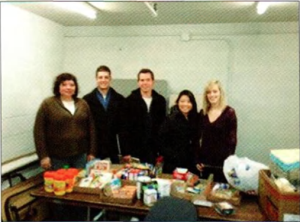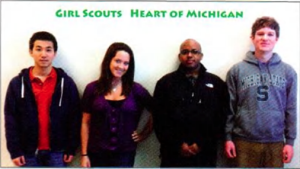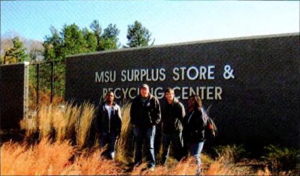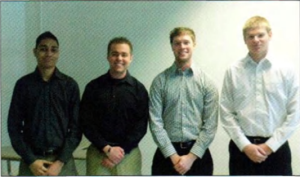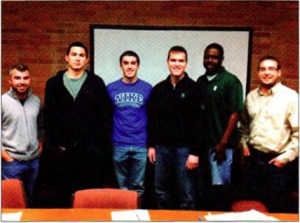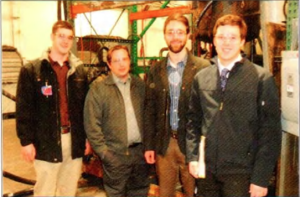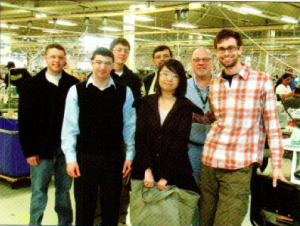Applied Engineering
Projects
We gratefully acknowledge Jim Manely and the Demmer Center for Business Transformation at Michigan State University for their guidance and assistance with our projects. We gratefully acknowledge Judy S. Jacobs, Director, Corporate & Student Relations Office, Michigan State University, Department of Supply Chain Management for her assistance in securing projects.
For information on becoming a project sponsor, please contact Dr. Laura Genik.
The following are the project sponsors and projects for the Spring of 2011:
Recommendations for Delivery Routes between Mid-Michigan Food Bank and Greater Lansing Food Bank
 There are two different food bank organizations in the mid-Michigan area: the Mid-Michigan Food Bank and the Greater Lansing Food Bank. Both food banks are less than lmile apart and cover 3 similar counties (Ingham, Eaton, and Clinton). They provide emergency food to individuals and families in need. Food is distributed through an extensive network of food pantries and community kitchens located throughout the greater Lansing area. The Food Bank annually serves tens of thousands of people, many of them seniors and children. Their recipients also include the “working poor,”those individuals who are employed but don’t earn enough to meet housing, health, transportation and food needs. We want to improve the transportation logistics of both the Greater Lansing Food Bank and Mid-Michigan Food Bank to better serve the community and increase efficiency. Today, there is overlap in the routing areas and unpredictability in the system due to various constraints such as time, staff, and communication. If this problem is ignored, it will be difficult to address when both food banks merge. By addressing these issues we can help to improve additional projects of concern such as food drives and the Garden Project. We will use value stream mapping and failure modes and effects analysis as methods to improve the current processes.
There are two different food bank organizations in the mid-Michigan area: the Mid-Michigan Food Bank and the Greater Lansing Food Bank. Both food banks are less than lmile apart and cover 3 similar counties (Ingham, Eaton, and Clinton). They provide emergency food to individuals and families in need. Food is distributed through an extensive network of food pantries and community kitchens located throughout the greater Lansing area. The Food Bank annually serves tens of thousands of people, many of them seniors and children. Their recipients also include the “working poor,”those individuals who are employed but don’t earn enough to meet housing, health, transportation and food needs. We want to improve the transportation logistics of both the Greater Lansing Food Bank and Mid-Michigan Food Bank to better serve the community and increase efficiency. Today, there is overlap in the routing areas and unpredictability in the system due to various constraints such as time, staff, and communication. If this problem is ignored, it will be difficult to address when both food banks merge. By addressing these issues we can help to improve additional projects of concern such as food drives and the Garden Project. We will use value stream mapping and failure modes and effects analysis as methods to improve the current processes.
Recommendations for Outreach and Systematic Record Keeping for Girl Scouts Operation
 Our Applied Engineering Sciences team is working with the Girl Scouts Heart of Michigan, which is responsible for coordinating programs for over 25,000 girls in the Mid-Michigan area. The problem statement that we are working off of is that the Girl Scouts organization is not effectively collecting cookie sales data, and because of this, they are unable to make informed decisions based off previous activities related to cookie sales.We are hoping to accomplish two goals with our project. The first is to use process mapping to analyze the current processes of both door-to-door cookie sales and booth sales. Process flow analysis helps to illustrate where problems exist, and by comparing the current process to the process that should be in place, we are hoping to identify where improvements can be made. The second goal is to create a system for data collection, because currently there is no such system in place. This would allow the Girl Scouts to know roughly where cookies are being sold and more importantly, where they are not. According to a survey done by the Girl Scouts organization, 85% of the people surveyed would buy cookies if they were asked. This implies that the cookie program has a lot of room for expansion if the right systems are put in place. With door-to-door sales, we will use a geographical information system to enhance communications and map out locations where cookies are and are not being targeted. With the booth sales we will create a standardized process to enable data collection, analyze which establishments are most profitable, and look at ways to expand their customer base. The underlying goal of the cookie program is not only to sell cookies, but to build confidence, character and courage in the young girls. It is very important to us that we align our project goals with the underlying goals of the cookie program and that we are able to create tangible results beneficial to the Girl Scouts organization.
Our Applied Engineering Sciences team is working with the Girl Scouts Heart of Michigan, which is responsible for coordinating programs for over 25,000 girls in the Mid-Michigan area. The problem statement that we are working off of is that the Girl Scouts organization is not effectively collecting cookie sales data, and because of this, they are unable to make informed decisions based off previous activities related to cookie sales.We are hoping to accomplish two goals with our project. The first is to use process mapping to analyze the current processes of both door-to-door cookie sales and booth sales. Process flow analysis helps to illustrate where problems exist, and by comparing the current process to the process that should be in place, we are hoping to identify where improvements can be made. The second goal is to create a system for data collection, because currently there is no such system in place. This would allow the Girl Scouts to know roughly where cookies are being sold and more importantly, where they are not. According to a survey done by the Girl Scouts organization, 85% of the people surveyed would buy cookies if they were asked. This implies that the cookie program has a lot of room for expansion if the right systems are put in place. With door-to-door sales, we will use a geographical information system to enhance communications and map out locations where cookies are and are not being targeted. With the booth sales we will create a standardized process to enable data collection, analyze which establishments are most profitable, and look at ways to expand their customer base. The underlying goal of the cookie program is not only to sell cookies, but to build confidence, character and courage in the young girls. It is very important to us that we align our project goals with the underlying goals of the cookie program and that we are able to create tangible results beneficial to the Girl Scouts organization.
Recommendations for Enhancing Storage Capability and Visibility for MSU Surplus Store
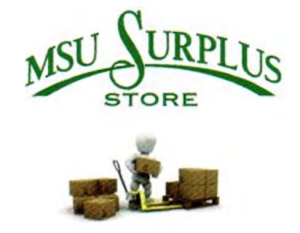 Situated on the campus of Michigan State University, the Surplus Store services over 45,000 students and 10,000 faculty members. The Surplus Store provides recycling, resale of items, and storage for faculty and students. One goal for this business is to recycle and reuse any item if possible. Since 1920 the organization’s vision is to become the premier university store in the nation by being resourceful, creative, and providing friendly and responsive customer service.
Situated on the campus of Michigan State University, the Surplus Store services over 45,000 students and 10,000 faculty members. The Surplus Store provides recycling, resale of items, and storage for faculty and students. One goal for this business is to recycle and reuse any item if possible. Since 1920 the organization’s vision is to become the premier university store in the nation by being resourceful, creative, and providing friendly and responsive customer service.
The MSU Surplus Store’s student storage program is now its second year. The MSU Surplus Store is gaining attention for its close proximity to students and its low prices for storage. Similar to most new business models several changes and improvements are required to benefit customers and the store itself. Our Applied Engineering Sciences team will be working to improve the pick-up and drop-off scheduling and routing, modernize the data collection process, and also work to implement several ideas to add value to the storage business. With the only direction of moving forward and our broad Applied Engineering Sciences knowledge base, we are bound for success.
To tackle the problems at hand we plan on using the Six Sigma framework of DMAIC and value stream mapping. Additionally, we plan to do a capacity analysis during peak student storage pick-up. We will be using the results w’e find to make recommendations that will simplify the collection and flow of information and improve the flow of units of storage.
Recommendations for Improved Marketing of the Fill the Bus Event for the Center for Service-Learning and Civic Engagement
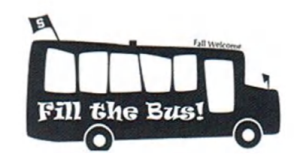 The Center for Service-Learning and Civic Engagement is a volunteer program at MSU that focuses on giving students an opportunity to get involved in their community. The Fill the Bus Program was started by CSLCE in fall of 2009 at MSU to help get freshman involved and interested in giving back to their community.
The Center for Service-Learning and Civic Engagement is a volunteer program at MSU that focuses on giving students an opportunity to get involved in their community. The Fill the Bus Program was started by CSLCE in fall of 2009 at MSU to help get freshman involved and interested in giving back to their community.
The Fill the Bus program gets students involved by having them donate school supplies, non-perishable food goods or health supplies. These donations are then collected, transported to a central location and divided up to be delivered to local charities where they can be best used to help people who need it
Through the help of Karen Casey, the director of CSLCE, the AES group hopes to collaborate with the dorms and local academic colleges in order to increase the participation of MSU students. The group also plans to use process mapping and project planning software to develop a system o f collection and distribution that will help make the Fill the Bus program more efficient.
The team also plans to study the reports from last year’s fundraiser to find the bottlenecks and potential problem areas, in order to find ways of improving the overall success of the program and coming up with contingency plans in case an unexpected event were to occur.
Recommendations for Lansing Web Sales Company to Develop Direct Link to Production for Indestructible Dog Toys
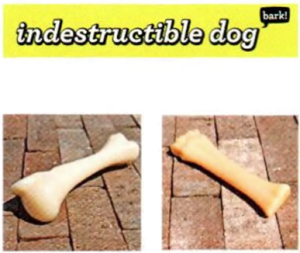 Our Applied Engineering Sciences team is working with Indestructible Dog Toys, an internet retailer that was founded in 2010 by partners Anthony Khedaywi and Patrick Kaplan. The premise behind their business is to find the most durable dog products on the market, bring them to one convenient website for customers, and provide them with a guarantee that the products will last no matter what dog gets his/her paws on them. As of now Indestructible Dog Toys only retails products online.
Our Applied Engineering Sciences team is working with Indestructible Dog Toys, an internet retailer that was founded in 2010 by partners Anthony Khedaywi and Patrick Kaplan. The premise behind their business is to find the most durable dog products on the market, bring them to one convenient website for customers, and provide them with a guarantee that the products will last no matter what dog gets his/her paws on them. As of now Indestructible Dog Toys only retails products online.
With the dog product industry actually growing during the current recession and only two big competitors, the company recently decided that they want to expand the business and make their own line of products, starting with a dog bone. With limited knowledge of the manufacturing industry. Indestructible Dog Toys met with our team to scope out the project objectives. Collectively we want to create a sourcing strategy that will assist the company in manufacturing a new indestructible dog bone.To complete the sourcing strategy we need to first better understand the dog toy industry. Next, we need to understand the injection molding process and how flavoring is added to plastics. Finally, we need to explore the requirements manufacturers have for related products to ensure a complete RFQ process is produced.
We will provide Indestructible Dog Toys with tools that will allow them to locate suppliers, find out pricing trends, and effectively receive best total cost quotes. Additionally, we need to educate them about industry standards. By doing this effectively, the company can grow faster than before in a growing market.
Marketing Analysis for XG Sciences An MSU High Tech Spin Off Company
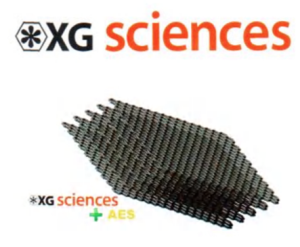 XG Sciences is a privately held corporation based in East Lansing, Michigan. They produce a diverse range of graphene nano-platelets for potential use in many applications including composites, ultra-capacitors, batteries and transparent conductive thin films. The core of their technology was developed at the Michigan State University Composite Materials and Structures Center in the College of Engineering.
XG Sciences is a privately held corporation based in East Lansing, Michigan. They produce a diverse range of graphene nano-platelets for potential use in many applications including composites, ultra-capacitors, batteries and transparent conductive thin films. The core of their technology was developed at the Michigan State University Composite Materials and Structures Center in the College of Engineering.
XG Sciences is searching for new applications and markets for their technology where they can compete successfully. One potentially large market is transparent conductive thin films used in display and solar cell technologies. These applications are currently dominated by indium-tin-oxide (ITO) and fiourine-tin-oxide (FTO) thin films. XG Sciences would like to explore these markets further with respect to their potential profitability and ability to be successful in the competitive environment.
This project is divided into two main objectives defined as market analysis and competitive environment analysis. Within each of these objectives multiple goals are defined which will provide utility to XG Sciences at the completion of the project.
Recommendations for Productivity Enhancement for Peckham Industries of Lansing, Michigan
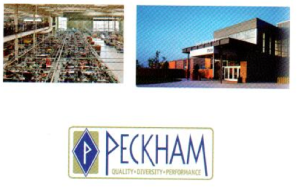 Peckham Inc. is a non-profit organization that specializes in apparel manufacturing, business services, environmental solutions and supply chain solutions. The company was founded in 1976 where it began to provide services and employment opportunities to disabled individuals. Today Peckham Inc. is one of the biggest vocational community rehabilitation programs in the state of Michigan. Peckham’s biggest customer is the United States government.
Peckham Inc. is a non-profit organization that specializes in apparel manufacturing, business services, environmental solutions and supply chain solutions. The company was founded in 1976 where it began to provide services and employment opportunities to disabled individuals. Today Peckham Inc. is one of the biggest vocational community rehabilitation programs in the state of Michigan. Peckham’s biggest customer is the United States government.
The project’s problem statement is that we will make implementable recommendations to Peckham that will help improve their processes of information visibility and product completeness. Our goal is to provide a uniform approach to capture and record job order information in a way that will allow managers more visibility as to job completeness. With an improved process Peckham seeks to reduce inspections and overall errors created by shortage and labeling issues. This in turn will reduce costs due to wrong information andjob incompleteness. Our group has been visiting the Peckham manufacturing facility to assist in developing improved operations processes. Additionally, we plan to begin work in testing and implementing some of our recommendations.
To solve these issues we plan on using the Six Sigma framework of DMAIC and value stream mapping. We will be using the results of the mapping to make improvements within the DMAIC approach. Peckham will be presented with before and after states with the improvements we have recommended. Our team plans on providing an action plan in order to implement our changes.
